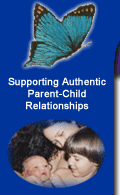
Articles
Thanks so much for sharing you wisdom with our readers. You are truly a blessing on the planet."
—An editor NAP Seattle

Naomi Aldort Library
 And They Played All Day
And They Played All Day
 Getting Out of the Way
Getting Out of the Way
 Helping Children Resolve Emotional Hurts
Helping Children Resolve Emotional Hurts How Children Learn Manners
How Children Learn Manners How to Give Advice to Children
How to Give Advice to Children
 Surviving the Toddler Years
Surviving the Toddler Years Toddlers: To Tame or to Trust
Toddlers: To Tame or to Trust The Ethics of Representing Childhood in Western Culture
The Ethics of Representing Childhood in Western Culture
 When Toddlers Bite
When Toddlers Bite
 How to Soothe a Crying Baby
How to Soothe a Crying Baby
 Taming the Tiger Mother
Taming the Tiger Mother

 Your Child is Like the Rain
Your Child is Like the Rain
 The Price of Praise - Part 1: Connecting to the Child's Own Feeling
The Price of Praise - Part 1: Connecting to the Child's Own Feeling
 The Price of Praise - Part 2: Expressing Appreciation
The Price of Praise - Part 2: Expressing Appreciation
 The Price of Praise - Part 3: Building Self-Confidence with Unconditional Love
The Price of Praise - Part 3: Building Self-Confidence with Unconditional Love Social Skills are Learned with Parents First
Social Skills are Learned with Parents First Beyond Validation: Raising Peaceful and Emotionally Resilient Children
Beyond Validation: Raising Peaceful and Emotionally Resilient Children
How to Soothe a Crying Baby
By Naomi Aldort
Question: My baby is two months old and cries a lot every evening. I offer to breastfeed but he pushes me away. I have a snugly and carry him a lot. What can I do to prevent his crying?
Answer: I am deeply moved by your question. It used to be that mothers were told to let their baby cry. Today, more and more parents understand the need to respond to the baby and take his crying seriously. Like you, many feel heartbroken when their baby cries in-spite of constant holding and care. Yet babies often cry even when held and responded to promptly.
The infant who is constantly held will not cry when hungry, tired or wet. He will communicate these basic needs quietly because he is right there on your body and the littlest cue can be responded to. He learns that he can ask for what he wants without raising his voice (the first communication lesson.)
By being close and responding to gentle cues you also spare the baby the stress of having to cry just to get her needs met. At the same time you know that if she does cry, the reason is not a basic need.
When away from human care, a baby is likely to feel terror and cry in despair. This is because he is completely helpless and has no way of knowing that you will ever return. By holding your baby, you know that this is not the case. Still, your baby may cry even in your loving arms.
Always insure first that the baby is fed, healthy, dry and that there is no reason for concern. Then kindly guess and try to respond to possible needs:
- Always hold your crying baby in your arms. often all he needs is closeness.
- The baby may be too hot, too cold, wet, feeling restricted in her clothes, or having something rub her skin in his clothes or diaper.
- Many parents over dress their babies; take a layer off and see how your baby responds.
- Your baby may need motion. Carry him in a snugly and go for a walk, dance, or sit with him in a rocker or a hammock.
- If your baby is arching back while crying, he may have gas pain or be constipated. If you are breastfeeding, avoid eating gas forming foods such as cabbage, broccoli, onion, beans, sugar and pasteurized dairy. Give the baby a few drops of chamomile tea, and gently massage his belly and back while bending his legs to help with digestion.
- Many babies calm down in a warm bath. It is worth trying.
- Music can totally capture a crying baby, but nothing is as wonderful as mom's singing voice.
- The sound of running water have been known to calm a baby.
- If your baby is over stimulated from going out, traveling in the car or seeing lots of people, he may need quiet time. Take him to a quiet room to rest with you.
- Some babies want to breastfeed in solitude. They will cry and refuse to nurse until you take them to a calm private place.
- Your baby may need to cry. Like you and I, a baby may feel overwhelmed and in need to let it all out in your loving arms. He may feel helpless, scared, uncomfortable, over stimulated or confused.
Your goal is to meet the baby's need. If nothing seems to satisfy him, you can assume that your baby needs to cry. Hold him and be a peaceful and loving listener. Teach your baby to be comfortable with his own emotions by validating his feelings. You can connect with him when he takes those famous short breaks from crying. Hold him and say something like, "I know you need to cry now and I am here to listen to you." Or, "I love you laughing and I love you crying. I love you no matter how you feel."
Being the loving listener when your baby needs to cry may be the hardest of all. It is yourself that you must calm down so you can provide your baby with a peaceful and supportive parent. If you seem lost or you panic, the baby may feel more scared. Always keep a crying baby in your arms. He will be done crying when his "therapy" session is over.
©Copyright Naomi Aldort
Reproduction of material from any pages of
NaomiAldort.com site
is strictly prohibited without written permission.
©Copyright Naomi Aldort.
